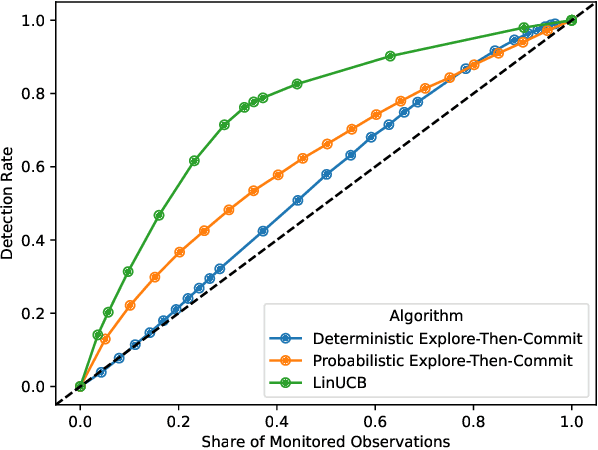Jacob Morrier
Reinforcement Learning for Efficient Toxicity Detection in Competitive Online Video Games
Mar 26, 2025



Abstract:Online platforms take proactive measures to detect and address undesirable behavior, aiming to focus these resource-intensive efforts where such behavior is most prevalent. This article considers the problem of efficient sampling for toxicity detection in competitive online video games. To make optimal monitoring decisions, video game service operators need estimates of the likelihood of toxic behavior. If no model is available for these predictions, one must be estimated in real time. To close this gap, we propose a contextual bandit algorithm that makes monitoring decisions based on a small set of variables that, according to domain expertise, are associated with toxic behavior. This algorithm balances exploration and exploitation to optimize long-term outcomes and is deliberately designed for easy deployment in production. Using data from the popular first-person action game Call of Duty: Modern Warfare III, we show that our algorithm consistently outperforms baseline algorithms that rely solely on players' past behavior. This finding has substantive implications for the nature of toxicity. It also illustrates how domain expertise can be harnessed to help video game service operators identify and mitigate toxicity, ultimately fostering a safer and more enjoyable gaming experience.
Evaluating the Quality of Answers in Political Q&A Sessions with Large Language Models
Apr 12, 2024Abstract:This paper presents a new approach to evaluating the quality of answers in political question-and-answer sessions. We propose to measure an answer's quality based on the degree to which it allows us to infer the initial question accurately. This conception of answer quality inherently reflects their relevance to initial questions. Drawing parallels with semantic search, we argue that this measurement approach can be operationalized by fine-tuning a large language model on the observed corpus of questions and answers without additional labeled data. We showcase our measurement approach within the context of the Question Period in the Canadian House of Commons. Our approach yields valuable insights into the correlates of the quality of answers in the Question Period. We find that answer quality varies significantly based on the party affiliation of the members of Parliament asking the questions and uncover a meaningful correlation between answer quality and the topics of the questions.
 Add to Chrome
Add to Chrome Add to Firefox
Add to Firefox Add to Edge
Add to Edge